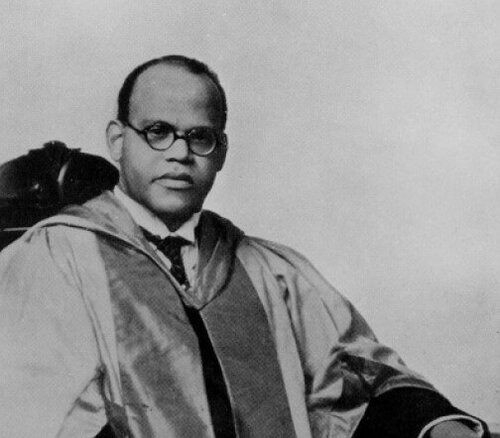IT’S FAIR to say that the name of Dr Harold Moody isn’t a household one in this country.
And that’s a surprise for the achievements of a man who historian Stephen Bourne has described as Britain’s Martin Luther King.
Dr. Moody is one of the unsung heroes of this country’s civil rights movement, but few people are familiar with his story.
The pioneering organisation he founded in March 1931, the League Of Colored People (LCP), has been credited with being a major influence in shaping the landmark 1965 Race Relations Act which prohibited discrimination based on colour or ethnicity and established the Race Relations Board, a precursor to the Commission for Racial Equality.
Moody forged a path for later generations to build on in the fight against racial inequality. And his life sheds light on the struggles of the pre-Windrush generation Black community who lived in this country at a time when equal rights were not guaranteed by law.

Born in Jamaica, in 1882 Moody travelled to England in 1904 to study medicine but despite his impressive academic achievements, Moody struggled to find work as a physician.
After three years of unsuccessful job-hunting, Moody took the bold step of setting up his own practice in Peckham, south London, in 1913.
Before the 1948 launch of the National Health Service he treated poor children for free, and welcomed Black people into his home who were denied lodging elsewhere.
Later in 1913, he married Olive Mable Tranter, a white nurse, despite the hostility to mixed-race relationships in Britain at that time.
High unemployment following the end of the First World War led to escalating racial tensions in Britain and port cities like Cardiff and Liverpool saw ‘race riots’ in 1919 as demobilised troops accused foreigners of ‘stealing’ jobs.
It was against this backdrop of rising racism that the LCP was formed.
Dubbed by historians as Britain’s first civil rights organisation it challenged the discrimination faced by Black people living in Britain.
Its inaugural members included prominent figures such as the writer and historian C. L. R. James, future President of Kenya Jomo Kenyatta, poet and BBC broadcaster Una Marson, and the American singer, actor and political activist Paul Robeson.
The LCP was a beacon of hope during a time when racial discrimination was rife. Moody lobbied politicians, trade unions and the civil service for Trinidadian oil workers based in Britain to be given fair wages and employment rights for Black seamen.
Moody embarked on a five-month tour in 1946 aimed at both raising funds for a London cultural centre however he contracted influenza and died at his home in Peckham in April 1947, shortly after returning from the tour.
In March 2019, the Nubian Jak Community Trust unveiled a plaque at London’s Central YMCA, where the LCP held many of its meetings.
The event was attended by members of the Moody family, historians, politicians, and race equality campaigners.
Google celebrated Dr Moody with a Doodle on September 1, 2020, sparking curiosity about his little-known contributions to British history.
Dr Harold Moody was part of a long line of pioneering activists who came to Britain from Jamaica. His unwavering commitment to social justice not only left a legacy for future generations, it highlighted the positive impact that just one person can make in the face of adversity and discrimination.


Comments Form
1 Comment
“Dubbed by historians as Britain’s first ‘civil rights’ organisation it challenged the discrimination faced by ‘African-skinned’ people living in Britain,” reports the Voice.
However, it is wrong to recast skin-colour prejudice; segregation, and racism, as experienced by African-heritage people, as a breach of “civil rights;” as it has been a popular thing to do for Left-wing people, since the 1970s.
When Ms Una Marson travelled to London in 1932, and became the first African-Caribbean woman to be employed by the BBC during World War II, her resignation was due to the unpleasant reaction of BBC listeners.
It was skin-colour prejudice, not a breach of “civil” rights which hurt Ms Marton.
African-heritage people must resist, and reject the Political Labour Left’s rebranding of skin-colour prejudice, and racism, as a breach of “civil rights.”
Recently, Labour and the Political Left, have rebranded, and change their “Civil-rights” phrase into an “inequality.”
“Inequality,” is the new word for skin-colour racism, as experienced by African-skinned people.
Likewise, Dr Harold Moody, should be recognise as England’s skin-colour justice campaigners; rather than England’s first “civil rights” campaigner.